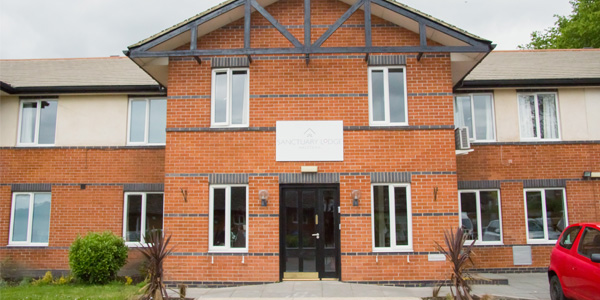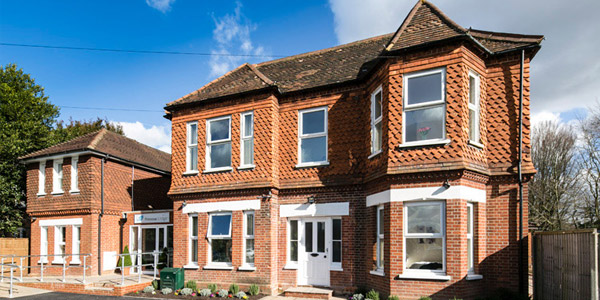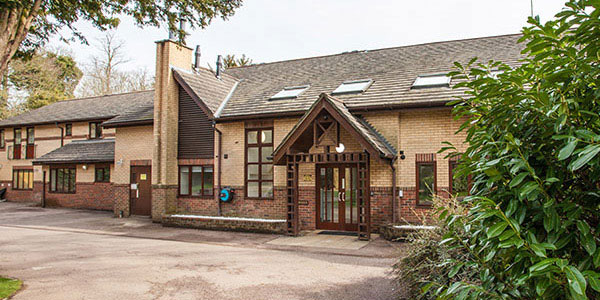Although addiction is a problem throughout the UK, it will come as little surprise to anyone who knows and loves Newham that the borough has been especially hard hit by this malaise: alcohol, illegal drugs and prescription medication are taking a terrible toll on Newham’s inhabitants, young and old, with relatively new substances such as spice joining long-established poisons such as heroin and cocaine in causing carnage on the streets.
However, there is a light at the end of the tunnel: there are now many facilities offering high-quality addiction treatment to people struggling with this terrible illness. If you or a loved one are one of those people, help is at hand: read on to discover how rehab can save your life.

Sanctuary Lodge is a state of the art detox and rehabilitation facility, se…
- Private
- Holistic Treatment
- Onsite gym
- Residential
UKAT Rehabs
At Primrose Lodge we genuinely care that our patients make a full recovery …
Liberty House Clinic is a fully furbished detox and rehabilitation facility…
Banbury Lodge is a private UKAT rehab facility based in Banbury, Oxfordshir…
Drug & Alcohol Rehab Services in London
- A
- B
- C
- D
- E
- F
- G
- H
- I
- J
- K
- L
- M
- N
- O
- P
- Q
- R
- S
- T
- U
- V
- W
- X
- Y
- Z
What Is Rehab?
Rehab – short for “residential rehabilitation” – is the term given to the process of getting treatment for addiction as a dedicated facility, and also applies to such a facility itself (which is where we get the phrase “going to rehab”). It is generally considered to be the most effective approach to treating addiction in terms of its ability to deliver a permanent recovery, thanks in large part to its dual approach tackling both the immediate challenge of physical dependency and the longer-term one of psychological addiction (many other forms of treatment focus only on either one of those two).

Rehabs are tranquil, secure, aesthetically pleasing, welcoming and – crucially – confidential institutions in which patients can concentrate fully on recovery having removed themselves from the day-to-day environment of substance abuse (confidentiality is crucial because patients are able to relax in the knowledge that their condition will remain secret).
If you attend rehab – typically on an inpatient basis, though some facilities do provide outpatient services – you will benefit from the presence of highly experienced medical professionals who understand the nature of addiction, and from the support of a peer group whose members are, like you, determined to turn their lives around and get back onto the path to happiness and success.
How Can I Get Someone into Rehab?
If you or a loved one are struggling with addiction, it is not mere hyperbole to state that every day counts when it comes to reaching out to help: the longer an addiction goes on, the greater the chance that it will end in tragedy as a result of a fatal overdose or an accident. However, treating someone who is not ready to be treated – who does not truly want to stop abusing alcohol and/or drugs – is a futile endeavour almost guaranteed to end in failure, so it is absolutely vital to develop the right mindset as quickly as possible.
This is one point at which we can step in: we can help arrange interventions for addicts who have not yet proven themselves able to admit to their condition, and for those who have and are reaching out to help we can assist in making the necessary preparations before heading to rehab.
The NHS can provide high-addiction treatment services, yet with demand already so high and growing across the country – especially in densely populated areas like Newham – waiting lists can be extremely long with no guarantee of a place. As noted, time is of the essence – so if you’re in Newham and are ready to reach out for help, call 0800 024 1455 to speak with an addiction specialist about some of the private options which may be available to you.
Advantages of Private Rehab
As mentioned above, rehab provides a pleasant, peaceful, secure and confidential setting in which the recovery process can begin and you can focus fully on your own well-being without the temptations of the outside world, and away from your substance/s of abuse.
Upon entering rehab you will be assessed to determine the nature and severity of your addiction, and to allow the medical staff to draw up your individualised treatment plan before you embark on a detoxification (“detox”) process during which your body is cleansed of substances of abuse; this process will be monitored by a medical team to ensure your safety, and any withdrawal symptoms which manifest may be treated with the appropriate medication.
Once you have gone through detox, you will move into the second main phase of rehab: therapy. A number of different therapy models (in both group and one-to-one settings) will be provided; the purpose of therapy in addiction treatment is to reveal the root causes of your addiction and, by so doing, demonstrate what led you into addiction so you can avoid making the same mistakes going forward. Therapy will also provide you with a number of psychological defence mechanisms against relapse.
Throughout treatment you will benefit from tailored dietary and fitness plans (integrated into your overall individual treatment plan) and from access to an array of other facilities which will vary from one rehab to another but which will all have the aim of making your stay as comfortable and as stress-free as possible and maximising the impact of your treatment.
However, the end of your treatment programme does not imply the end of your recovery: recovery is an ongoing process requiring dedication and diligence, and you should not consider yourself fully free from addiction just because you have left rehab. Because of this, good rehabs will provide up to a year’s free aftercare to give you the comfort of ongoing support during this next crucial phase of your recovery.
What Does Rehab Cost in London?
The cost of private rehab will vary from one facility to another depending on the nature of the treatment programs offered and of the standard of the facility in question (for example, luxury rehabs can logically be expected to cost more). Roughly speaking, standard costs in or near Newham range from £5,500 to £11,000 per month, although the cheapest treatment may be obtained for as little as £834 per week. For more specifics, call to speak with one of our addiction advisers.
NHS Addiction Treatment Options Newham
For a number of reasons – possibly to do with the costs mentioned above, or perhaps because they do not feel able to spend the necessary amount of time away from family obligations or work commitments – some people do not feel that private rehab is an appropriate option for them. If you believe yourself to be in this category, for whatever reason, it is vital that you do not give up hope: there are a large number of NHS and charity resources in and near Newham which can help you (or a loved one) overcome addiction. Talk to your GP about which of these may be open to you and how you might access them.
Advantages of NHS Treatment
The most obvious advantage of going down the NHS route, as opposed to engaging in private rehab, is cost-related: NHS services are free at the point of delivery while, as noted above, the cost of private rehab can discourage some people from seeking treatment (though it is important to bear in mind that the costs of not getting treatment can be catastrophic, and as a result private rehab should be seen rather as an investment).
Another advantage the NHS offers is its geographic reach: it operates right across the country and its facilities, therefore, are often much closer to those in need than some private rehabs which may lie many miles away from Newham. The quality of NHS services is high; however, it does vary from one trust to another and, again, waiting times can be excessive, sometimes distressingly so.
Addiction Support Groups
Alongside treatment facilities and programs able to address the immediate challenges of addiction and dependency, various organisations are active across the UK helping addicts who are in recovery. Some of these operate on a support group model: groups of people who are themselves recovering addicts who convene at regular (often weekly) meetings for mutual support, advice on staying sober and clean, and simple companionship and friendship (which can be key for many addicts who struggle with loneliness after turning their backs on drug-abusing peer groups).
Support group attendees may be only recently free from addiction, or may have been clean for long periods; they come from all demographics and are brought together by their shared experiences of addiction and recovery. Usually, attendance at such groups is free: the only requirement is a commitment to abstaining from substances of abuse.
The best-known support group organisation – and one on which many others have been modelled – is Alcoholics Anonymous (AA). Founded in 1935, AA provides the famous 12-step programme of personal and spiritual progress (one of the steps is to acknowledge that a higher power – such as God – governs one’s life and can help with an alcoholic’s recovery). Narcotics Anonymous (NA) was founded in 1953 based on the AA model and is the second-largest support group organisation internationally, specifically aimed at helping recovering drug addicts.
Along similar lines are Cocaine Anonymous(CA), Heroin Anonymous (HA), Marijuana Anonymous (MA) and Crystal Meth Anonymous (CMA), all of which operate 12-step programmes. There are also support groups such as Al-Anon and Nar-Anon assisting the families and friends of addicts which typically hold meetings alongside those for the addicts themselves.
Types of Counselling

One form of treatment which has proved very popular both for recovering addicts who have completed a treatment programme such as those provided at rehab, and for addicts who have not yet engaged in such a treatment programme but who intend to and seek meanwhile to manage their addiction, is individual counselling. Private addiction counsellors operate rather like regular psychotherapists (though of course with a focus primarily on the causes and consequences of addiction): they’re typically seen by private appointment, usually on an ongoing basis (for example weekly), and charge per appointment.
Access to individual counsellors is usually limited to pre-agreed working hours, although some do make themselves available for emergencies. Private counsellors offering a huge range of therapy models and approaches to treatment – including some extremely niche methods – can be found throughout the country, with a great many working within Greater London.
Reaching Newham in London
The borough of Newham is found in east London. Its neighbouring areas are Barking & Dagenham, Redbridge, Waltham Forest, Hackney, Tower Hamlets, and Greenwich, and the borough has 20 wards.
The Newham wards are Stratford & New Town, Forest Gate North, Manor Park, Little Ilford, Forest Gate South, West Ham, Green Street West, Green Street East, East Ham North, Wall End, East Ham Centre, Boleyn, Plaistow North, Canning Town North, Plaistow South, East Ham South, Canning Town South, Custom House, Beckton, and Royal Docks. The southern border of Newham is the River Thames. If you have to drive around the borough, keep in mind that there are a number of useful large roads to use for quicker access including the A13 or Newham Way and the A1020, allowing access to the local London City Airport. At the same time, if you consider using public transportation, the local stations are serviced by the DLR,, District Line, Hammersmith & City Line, the improved Jubilee Line (London Underground), the London Overground, and a huge number of bus lines. The Woolwich Ferry is also accessible in Newham, as is the Emirates Air Line cable car.
There are multiple opportunities for your relaxing rehab-focused outings. They may be part of the holistic therapies some rehabs in the area provide. Found in the borough are the 80-hectares-wide Metropolitan Green Belt, as well as the adventurous Queens Market and the Stratford Circus Arts Centre.
How to get to Sanctuary Lodge from Newham?
Sanctuary Lodge is a state-of-the-art, 24-bedroom detox and rehabilitation facility set in a tranquil neighbourhood in the pretty market town of Halstead, Essex. Sanctuary Lodge’s high-quality facilities and highly experienced medical and support staff create the ideal environment in which to address the key questions at the heart of recovery from addiction, and to embrace its fully comprehensive holistic rehabilitation programme.
Halstead is not served by the national rail network. To get to Halstead from Newham by road, take Newham Way/A13 to the North Circular Road/A406 and head to the M11; join the motorway towards Cambridge, and stay on until the A120(E) exit towards Colchester. Continue onto the A120, then take the A131 and stay on that road directly into Halstead.
Sanctuary Lodge
Hedingham Road
Halstead
Essex
CO9 2DW





